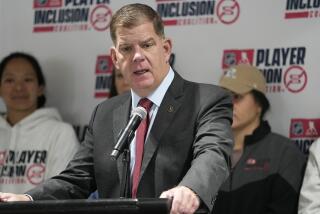Levitt Pushes for NHL Talks
Former U.S. Securities and Exchange Commission Chairman Arthur Levitt, whose gloomy report on the state of the NHL is the backbone to the current lockout, reiterated the poor financial condition of the league Wednesday and said that the two sides needed to restart negotiations for a new collective bargaining agreement.
Levitt, hired by the NHL to conduct an independent investigation, said in February that league teams lost $273 million during the 2002-03 season and predicted a bleak future for the league should those losses continue.
The National Hockey League Players’ Assn. disputed some of Levitt’s findings, saying that the report did not present a complete financial picture.
“Arguing about the accuracy of the report, whether the numbers may or may not be reliable, may just be a diversion,” Levitt said in a telephone interview arranged by the Mighty Ducks.
Levitt said he was “satisfied that the numbers are as sound as can be” and urged that talks be restarted to end the 35-day-old owners’ lockout. Similar opinions are beginning to be expressed by union members.
“It’s asinine and it’s both sides,” Calgary defenseman Andrew Ference said in the Calgary Sun. “How are you going to solve a conflict without communication? I don’t understand the motivation behind sitting around.”
Ference is one of a few players who have strayed from the union’s line. The others who have made comments made retractions within a couple of days of the original statement.
No new negotiations are planned and Levitt offered no suggestions how to resolve the key issue.
“I don’t want to stray into that area,” Levitt said. “That is a labor management discussion. There are certain buzzwords that terrify each side. If I look at this business model, assuming I accepted the accuracy that 71 to 73 cents out of every dollar are going to salaries, you realize you have to address that first.”
Still, he said: “Don’t talk [salary] caps because that closes down the discussion. It is pretty obvious what has to be done and there are a limited number of ways to do it.”
NHLPA officials have issues with what they feel were the parameters Levitt was given to do the report.
Ted Saskin, senior director of the players’ union, said: “I’m not disputing his integrity, but what was the mandate he was given and the starting point he used?
“If we retained Arthur Levitt and paid him millions of dollars and what we wanted him to look at was the overall economic impact on owners and in doing so account for all related entity revenue, all tax implications, all expansion proceeds and all other things not accounted for in the league accounting process, I’m sure we would get a much different picture than the league attained with the mandate they gave him.”
But that theory does not hold with some independent sports economists.
“Arthur has the respect and credibility that comes with the report he released,” said Paul Swanguard, managing director of the Warsaw Sports Marketing Center at the University of Oregon. Union leaders argue about “some numbers or that the union wasn’t involved in the process. I think they are grasping at straws as opposed to being willing to accept the fact that the business is a lot worse off than they want to admit.”
Saskin also said that NHL Commissioner Gary Bettman’s stance that the league would not compromise made further talks unlikely at this time.
More to Read
Go beyond the scoreboard
Get the latest on L.A.'s teams in the daily Sports Report newsletter.
You may occasionally receive promotional content from the Los Angeles Times.







